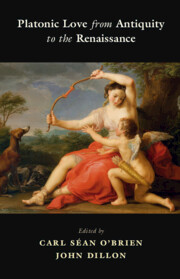229 results
Chapter 5 - Plutarch As a Polemicist
-
-
- Book:
- The Cambridge Companion to Plutarch
- Published online:
- 29 June 2023
- Print publication:
- 13 July 2023, pp 101-121
-
- Chapter
- Export citation
(D.J.) YOUNT Plato and Plotinus on Mysticism, Epistemology, and Ethics. London: Bloomsbury Academic, 2018. Pp. 311. £99. 9781474298421.
- Part of
-
- Journal:
- The Journal of Hellenic Studies / Volume 142 / November 2022
- Published online by Cambridge University Press:
- 11 April 2023, pp. 447-448
- Print publication:
- November 2022
-
- Article
- Export citation
Notes on Contributors
-
- Book:
- Platonic Love from Antiquity to the Renaissance
- Published online:
- 25 August 2022
- Print publication:
- 01 September 2022, pp viii-xii
-
- Chapter
- Export citation
Copyright page
-
- Book:
- Platonic Love from Antiquity to the Renaissance
- Published online:
- 25 August 2022
- Print publication:
- 01 September 2022, pp iv-iv
-
- Chapter
- Export citation
Introduction
-
-
- Book:
- Platonic Love from Antiquity to the Renaissance
- Published online:
- 25 August 2022
- Print publication:
- 01 September 2022, pp 1-12
-
- Chapter
- Export citation
Index Locorum
-
- Book:
- Platonic Love from Antiquity to the Renaissance
- Published online:
- 25 August 2022
- Print publication:
- 01 September 2022, pp 319-322
-
- Chapter
- Export citation
Acknowledgements
-
- Book:
- Platonic Love from Antiquity to the Renaissance
- Published online:
- 25 August 2022
- Print publication:
- 01 September 2022, pp vii-vii
-
- Chapter
- Export citation
Contents
-
- Book:
- Platonic Love from Antiquity to the Renaissance
- Published online:
- 25 August 2022
- Print publication:
- 01 September 2022, pp v-vi
-
- Chapter
- Export citation
Part IV - Platonic Love during the Renaissance
-
- Book:
- Platonic Love from Antiquity to the Renaissance
- Published online:
- 25 August 2022
- Print publication:
- 01 September 2022, pp 199-288
-
- Chapter
- Export citation
Part III - Love and Metaphysics during the Middle Ages
-
- Book:
- Platonic Love from Antiquity to the Renaissance
- Published online:
- 25 August 2022
- Print publication:
- 01 September 2022, pp 151-198
-
- Chapter
- Export citation
Bibliography
-
- Book:
- Platonic Love from Antiquity to the Renaissance
- Published online:
- 25 August 2022
- Print publication:
- 01 September 2022, pp 289-312
-
- Chapter
- Export citation
Chapter 7 - A Platonist ‘Ars Amatoria’
- from Part II - Development of Platonic Love in Antiquity
-
-
- Book:
- Platonic Love from Antiquity to the Renaissance
- Published online:
- 25 August 2022
- Print publication:
- 01 September 2022, pp 125-132
-
- Chapter
- Export citation
Subject Index
-
- Book:
- Platonic Love from Antiquity to the Renaissance
- Published online:
- 25 August 2022
- Print publication:
- 01 September 2022, pp 313-318
-
- Chapter
- Export citation
Part II - Development of Platonic Love in Antiquity
-
- Book:
- Platonic Love from Antiquity to the Renaissance
- Published online:
- 25 August 2022
- Print publication:
- 01 September 2022, pp 81-150
-
- Chapter
- Export citation
Part I - Love in Plato
-
- Book:
- Platonic Love from Antiquity to the Renaissance
- Published online:
- 25 August 2022
- Print publication:
- 01 September 2022, pp 13-80
-
- Chapter
- Export citation
Chapter 14 - Pico della Mirandola on Platonic Love
- from Part IV - Platonic Love during the Renaissance
-
-
- Book:
- Platonic Love from Antiquity to the Renaissance
- Published online:
- 25 August 2022
- Print publication:
- 01 September 2022, pp 222-237
-
- Chapter
- Export citation

Platonic Love from Antiquity to the Renaissance
-
- Published online:
- 25 August 2022
- Print publication:
- 01 September 2022
C. HUFFMAN Aristoxenus of Tarentum: The Pythagorean Precepts (How to Live a Pythagorean Life). Cambridge: Cambridge University Press, 2019. Pp. xii + 636. £130. 9781108425315.
- Part of
-
- Journal:
- The Journal of Hellenic Studies / Volume 141 / November 2021
- Published online by Cambridge University Press:
- 03 December 2021, pp. 291-292
- Print publication:
- November 2021
-
- Article
- Export citation
STUDIES ON SIMPLICIUS - (I.) Hadot Simplicius the Neoplatonist in Light of Contemporary Research. A Critical Review. With two contributions of Philippe Vallat. Translated from the French by Ian Drummond. (Academia Philosophical Studies 67.) Pp. 262. Baden-Baden: Academia, 2020 (originally published as Le néoplatonicien Simplicius à la lumière des recherches contemporaines: un bilan critique, 2014). Paper, €54. ISBN: 978-3-89665-894-4.
-
- Journal:
- The Classical Review / Volume 71 / Issue 2 / October 2021
- Published online by Cambridge University Press:
- 02 August 2021, pp. 381-383
- Print publication:
- October 2021
-
- Article
- Export citation
THE EDITORS OF PLOTINUS - (S.) Stern-Gillet, (K.) Corrigan, (J.C.)Baracat JR (edd.) A Text Worthy of Plotinus. The Lives and Correspondence of P. Henry S.J., H.-R. Schwyzer, A.H. Armstrong, J. Trouillard and J. Igal S.J. (Ancient and Medieval Philosophy Series 1, 59.) Pp. xxxii + 396, ills. Leuven: Leuven University Press, 2021. Cased, €98. ISBN: 978-94-6270-259-2.
-
- Journal:
- The Classical Review / Volume 71 / Issue 2 / October 2021
- Published online by Cambridge University Press:
- 06 July 2021, pp. 365-367
- Print publication:
- October 2021
-
- Article
- Export citation



